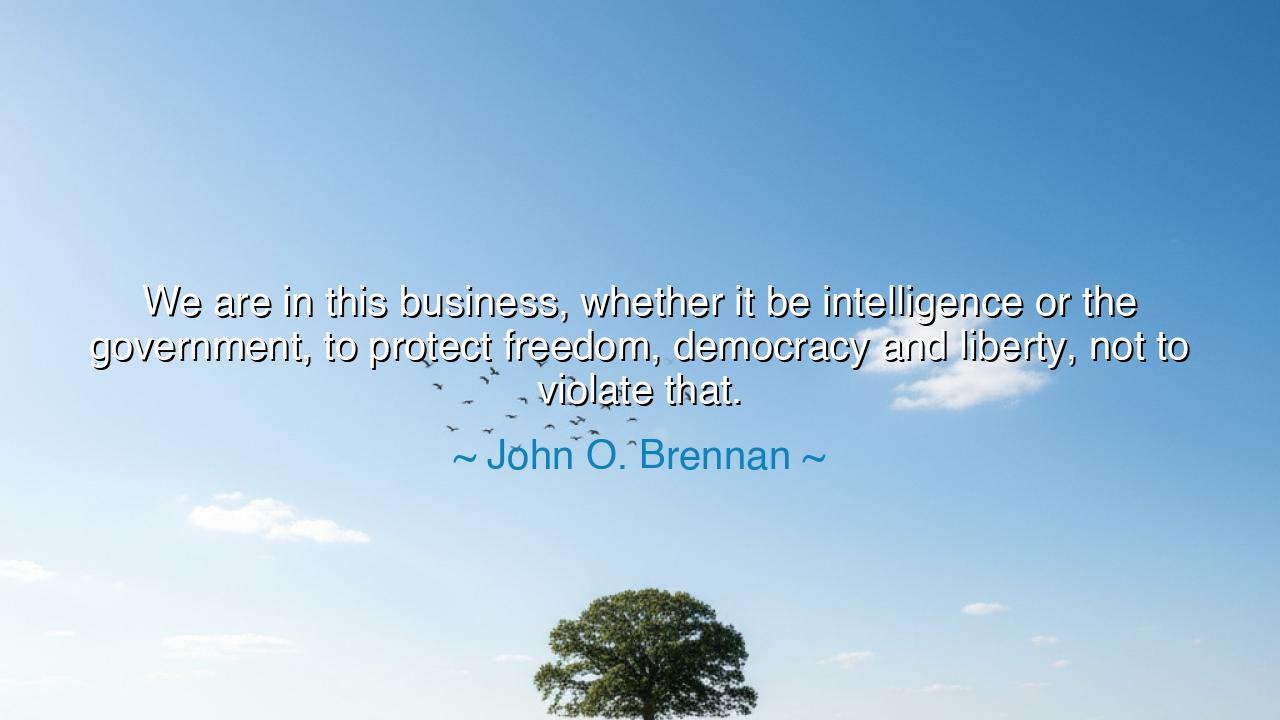
We are in this business, whether it be intelligence or the
We are in this business, whether it be intelligence or the government, to protect freedom, democracy and liberty, not to violate that.






The words of John O. Brennan, former Director of the Central Intelligence Agency, rise like a solemn oath spoken in the halls of service: “We are in this business, whether it be intelligence or the government, to protect freedom, democracy, and liberty, not to violate that.” In this declaration lies both duty and warning—a reminder that the instruments of power exist not for domination, but for protection; not for control, but for the defense of human dignity. Brennan speaks from within the heart of governance, where power and morality meet, often uneasily. His words are both a creed and a confession: that those who serve the state must guard against the temptation to become the very thing they oppose.
John O. Brennan, a man long immersed in the shadowed realms of national security, uttered these words in defense of the ideals that give meaning to his work. For the intelligence community, by nature, walks a perilous line—between secrecy and transparency, between protection and intrusion. Brennan’s statement, therefore, is more than political—it is philosophical. It is a reminder that freedom, democracy, and liberty are not abstractions to be spoken of in ceremonies, but living principles that must be honored even when unseen. The true test of character, he implies, is not in moments of peace but in the choices made when fear and power whisper that the end justifies the means.
To understand the weight of his words, we must look into the history of nations. Every age has seen governments rise with noble intent and fall into tyranny when vigilance faded. Consider the tale of Rome, whose republic was born from the dream of shared governance and justice. Its senators once swore to serve the people, to protect the libertas of every citizen. Yet, as fear grew and ambition deepened, men like Julius Caesar seized power in the name of protection—until liberty was consumed by empire. The lesson of Rome is clear: when those entrusted to guard freedom lose sight of its sacredness, they destroy it in their very effort to preserve it. Brennan’s words echo this ancient truth—that the tools of protection must never become the chains of oppression.
Throughout modern history, too, this balance has been tested. After the attacks of September 11, 2001, nations across the world faced the moral trial of how far to go in defending their people. In those days of uncertainty, intelligence agencies gained vast powers to surveil, to detain, to act in secrecy. Yet even as they worked to protect, the shadow of overreach grew. Brennan’s quote emerges from that crucible. It is the reflection of a man who saw both the necessity of strength and the danger of excess, and who came to understand that the greatness of a nation is not measured by its might, but by its adherence to the principles it claims to defend.
His words are also a call to conscience, not only for those in government but for all who hold influence over others. To protect freedom is to restrain one’s own power; to uphold democracy is to listen to dissenting voices; to preserve liberty is to serve with humility. In every sphere—whether in leadership, in family, in community—the same law applies: power that forgets its purpose corrupts, but power that remembers its duty ennobles. This is the moral geometry of the universe, repeated in the wisdom of every age.
Consider the example of George Washington, who, though victorious in war, refused the crown. He understood that the truest way to protect liberty was through restraint. In stepping down from power, he taught a lesson more lasting than any battle: that freedom endures only when those who wield authority remember they are its servants, not its masters. Brennan’s declaration, though born in the world of intelligence, echoes Washington’s spirit—the belief that to serve justly is the highest form of power, and that every act of government must bow before the principles of the people.
Therefore, O listener, take this teaching to heart: whether you hold the trust of a nation, a family, or a single soul, let your authority be guided by principle, not pride. Remember always that to protect freedom is not merely to guard it from enemies without, but to defend it from corruption within. Let your strength be tempered with mercy, your vigilance with wisdom, and your ambition with humility. For every generation must fight its own quiet war—the war between fear and freedom, between power and righteousness.
And so, as John O. Brennan reminds us, let all who lead remember this sacred charge: we serve not to dominate, but to defend; not to silence, but to safeguard. For when government and intelligence remain rooted in justice, they become not instruments of oppression, but guardians of light. And when the powerful walk in remembrance of this truth, the flame of liberty—fragile yet eternal—continues to burn across the ages, illuminating the path for all who follow.






AAdministratorAdministrator
Welcome, honored guests. Please leave a comment, we will respond soon